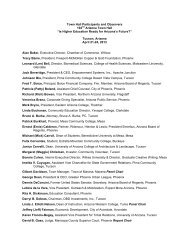Background Report - Arizona Town Hall
Background Report - Arizona Town Hall
Background Report - Arizona Town Hall
Create successful ePaper yourself
Turn your PDF publications into a flip-book with our unique Google optimized e-Paper software.
Letitia Chambers is the President and CEO of the Heard Museum in Phoenix, which showcases American<br />
Indian art, including both traditional and contemporary works. Its mission is to educate the public about the<br />
heritage and living cultures of the indigenous populations of the Americas. The Heard is nationally and<br />
internationally known for the quality of its exhibits and programs. Dr. Chambers has previously held senior<br />
management positions in the private sector, government, and education. She served as President and CEO of a<br />
Washington, D.C., based consulting firm, and later as a Managing Director at Navigant, a global consulting firm.<br />
Dr. Chambers headed up the system of higher education for the state of New Mexico where she worked to<br />
revamp and reform key aspects of the system. She led the agency responsible for oversight of all public colleges,<br />
universities, and community colleges in the state. Dr. Chambers also chaired the New Mexico Educational<br />
Trust Board, served as a Board Member of the New Mexico Student Loan and Guarantee Corp, and was an<br />
active Commissioner of the Western Interstate Commission on Higher Education. She was nominated in 1996 by<br />
the President and confirmed by the Senate to be U.S. Representative to the United Nations General Assembly,<br />
a position of ambassadorial rank. In that capacity she made significant contributions as a member of the<br />
Management and Budget Committee of the General Assembly. In 1992, she served on the Clinton/Gore transition<br />
team as Chief Budget Advisor, leading the Budget Policy Group and developing drafts of the President’s<br />
Economic Plan. Earlier in her career, Dr. Chambers served as Staff Director of the U.S. Senate Committee on<br />
Labor and Human Resources, which had jurisdiction over education, labor law, and social service programs.<br />
She was the first woman to head the staff of a major standing committee of the U.S. Senate. Prior to that she<br />
served as a senior staff member on the Senate Budget Committee and the Senate Special Committee on<br />
Aging. Dr. Chambers has served on corporate boards, particularly in the financial sector, and on numerous<br />
educational and philanthropic boards, many of which have focused on the arts and American Indian arts<br />
and cultures. A graduate of the University of Oklahoma, she holds a doctorate in educational research and<br />
curriculum development from Oklahoma State University.<br />
Gordon Knox is currently the director of the <strong>Arizona</strong> State University Art Museum. Previously Knox led Global<br />
Initiatives at the Stanford Humanities Lab, where he identified, developed, and implemented international<br />
projects that combine the understandings and techniques of the humanities and the sciences, and engage them in<br />
on-the-ground efforts to effect social change. Prior to Stanford, Knox was artistic director at the Montalvo Arts<br />
center in Saratoga, California, where he designed, developed, and established the organization’s international<br />
artist residency program. Implementing his commitment to the open flow of ideas and underscoring his belief<br />
that the advancement of civil society requires articulate critical analysis, Knox helped establish Montalvo as<br />
an institution recognized for ambitious projects often involving unusual collaborations. During the 1990’s, as<br />
the founding director of the Civitella Ranieri Foundation in Italy, Knox envisioned and established a center for<br />
the arts designed to advance and widen contemporary cultural practice by engaging the voices and thinking of<br />
practitioners from all parts of the world and providing them with excellent conditions to advance their work.<br />
Civitella quickly became a new model for international, multidisciplinary residency programs. Knox’s interest<br />
in the relationship between the arts and society and in critical, artistic inquiry emerges from his studies in social<br />
anthropology focusing on the relationship between ideas and social action. Knox studied anthropology at the<br />
University of California Santa Cruz, Cambridge University, and the University of Chicago.<br />
Chapter 22 | 221




